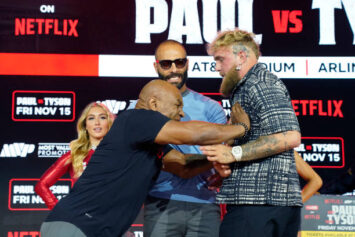Monday, Salon.com ran an excerpt from Wyclef Jean’s memoir, “Purpose: An Immigrant’s Story”. The titillating portion of the excerpt surrounded the story of his roller coaster love affair with Lauryn Hill. If you didn’t know (and you probably already do), Clef and Lauryn had a “thing” while Clef was courting his future wife Claudinette and this thing he had with L-Boogie (“a daring kind of love,” he called it) is what eventually shuttered The Fugees. When the love deteriorated, so did the Clef, L and Pras.
I didn’t even finish the whole excerpt, because it’s a yawner. If you know the Fugees, you know this story. And the details were a bore – at least as Clef told them. (Really all you need to do to get a gripping account of the story – again, as we all know – is to listen to Lauryn’s seminal “Ex-Factor” off of her landmark debut album.)
But I was riveted by a portion of the excerpt and it came at the beginning, as Clef was setting the scene for the Fugees rise:
“In 1996, there was so much great music out that for us to sell 15 million records worldwide really meant something. Hip-hop and R&B were at their best that year: Biggie and Tupac had just released their masterpieces, Jay-Z was heating up, TLC was at the top of the charts with “CrazySexyCool,” and Wu-Tang had us all in check. D’Angelo’s “Brown Sugar” was out, and Michael and Janet Jackson had just dropped “Scream.” We had to have skills to take those charts by storm the way we did.”
For the past six or seven years, my crew and I have had a continued debate over what was the best music year of our listening-lives. Was it 1993 (debuts from Wu-Tang, Souls of Mischief and Black Moon; Midnight Marauders and Return of the Boom Bap; Jodeci and R Kelly classics; Nas-anticipation)? 2000 gave us that Soulquarian run (Voodoo, Mama’s Gun, Fantastic Vol. 2, Like Water For Chocolate), plus the bulk of Black on Both Sides’ shelf life and Reflection Eternal’s classic debut Train of Thought; The Marshall Mathers LP.
I’ve always been partial to 2000, but the albums that made that year special were niche albums, art that skewed insular. 1996 was big – like “capital BEE-EYE-GEE” big. Not just, big and dope and impactful. When you have the three most iconic rappers of the modern era either in their primes or debuting (Clef forgot Nas was deep in his Nas Escobar creative rage); the most virtuosic singer in new black music dropping his debut; the Jacksons still popping and TLC selling ship-loads of albums – that’s a gargantuan moment in time for music. By the end of 1996 they were a full-fledge juggernaut. You could easily make an argument that it was the best year in music over the past 25 years. And, in that year, we tend to forget just how large the Fugees were. That makes the Fugees a historic band. For me, at least, this is a new way of processing the group and its short-lived reign.



